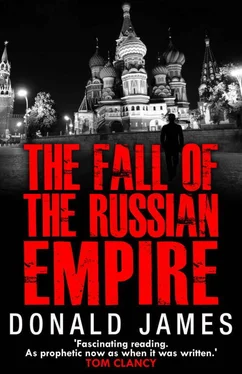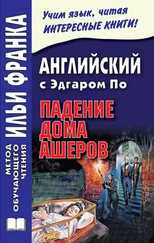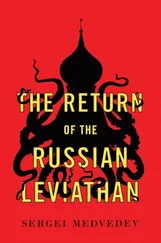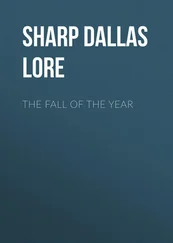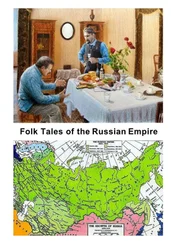Donald James
THE FALL OF THE RUSSIAN EMPIRE
The château stood above the village, a cluster of turrets and square pigeonniers . A pair of white doves circled it, brilliant in the sunshine. I drove under the clock tower and stopped the car in the cobbled courtyard. On both sides arched openings in stone barns gave into a darkness where cattle stirred.
As I got out of the car a man descended the stone staircase ahead. He was in his sixties, slightly built. I crossed the courtyard towards him. “Monsieur le Marquis de Nerval?”
“Yes.” He inclined his head with grave politeness.
“I wrote to you to ask if I might come and see you,” I said. “My name is Georges de Nerval.”
We shook hands.
“Georges de Nerval,” he shook his head, smiling now. “Yet you are not French?”
“No,” I said, “I’m Russian. I was born in Moscow during the events of the nineteen eighties. That much I know.”
“And you’ve come here in the hope of discovering more.”
“If possible.”
“Come in and take an apéritif ,” he said. “It just may be that I have something for you.”
We entered the cool flagged hallway. I looked curiously at the faded elegance around me. No far-off bell tolled in my memory, no distant mirror glinted a sunlit shaft of childhood. The portraits on the walls were of small men with fair hair and light eyes. There was no trace of my dark complexion, my height, my Slavonic features.
Like so many of Russia’s children I have never known who my parents were. Born amidst the cataclysmic events of the nineteen eighties in the former Soviet Union, I spent my childhood in refugee camps and orphanages. I have a name which I have no reason to believe is my own; I have an education provided by an anonymous refugee trust. But I am not alone in needing roots.
I turned from my examination of the portraits on the walls. Monsieur de Nerval was smiling wryly. “We bear the same name Monsieur,” he said, “but…” he looked from me to the portraits… “no, I see no help there.”
We walked out onto the terrace and sat down.
“When I received your letter,” he said, “I was naturally curious. I believe myself to be the last of the de Nerval line.” He looked out across the rolling hills. “But Moscow is far away, the de Nervals have been small country gentlemen for centuries. I can find no evidence that we were great travelers.” He paused. “So one thinks of military service. There was, it’s true, a de Nerval in the army of Napoleon. But he died at Iena, before the Emperor’s Russian campaign.”
I felt my disappointment acutely. And strangely enough I could detect, too, a certain sadness in the Marquis.
“You’re saying, Monsieur, that the de Nerval family has no Russian connections whatsoever.”
He pursed his lips. “There is one curious item. A fact which led me to encourage you to come here today.”
I sat forward in my seat
“Upstairs in the attic,” he said, “I have an old traveling trunk. It was sent here many years ago by a firm of German lawyers on the death of an old lady who, it appears, used the name de Nerval. The accompanying letter from the lawyers has been lost.”
“An old lady?”
“Too old to be your mother.”
“And the trunk — what connections might that have with me?”
“The trunk is full of documents. I am unable to tell what connection it might have with you,” he smiled. “I am after all unable to read its contents, Monsieur. They are all in Russian.”
I could have shouted with joy. A trunkful of Russian documents in a house in central France, a house that bore the name I bore.
A few minutes later we sat in an enormous beamed attic. Sunlight pierced the gaps in the roof tiles and fell on dusty tables stacked high with old books, frameless portraits and chipped crockery. The empty case of a grandfather clock stood between huge walnut cupboards of a century earlier. Delicate, gold-leafed chairs with broken legs leaned against each other for support.
The Marquis opened the shutter on a mansard window and led me across the flood of sunlight to a table on which an old traveling trunk lay. Its curved top was covered in frayed dark-blue leather and carried a no longer recognizable emblem, once stamped in gold.
I opened the trunk. Inside were packets of letters tied with string, stained typescripts of what looked like interviews conducted God knows how long ago — memoirs, diaries and old Soviet official documents.
I stayed two days at the château de Nerval reading through the bundles of papers in the old blue-leather traveling trunk. At the end of my time at the château I had decided to write this book.
* * *
The diaries, interviews and typescript memoirs on which the following account is based were assembled by a survivor of the great events of the 1980s which finally swept away the Soviet Union. For me the story must have a particular poignancy. In the course of reading the documents in that battered trunk I discovered who I was.
One strange, almost flinching fragment among the documents can be said with certainty to be written by the original collector, by the woman I now believe to have been my mother. I have let it stand as the introduction to this book:
Believe me, Brothers, I am a nobody. But I have brought these documents together as an act of homage to a man who was never my husband but who was the father of my child. It is the only way I can conceive of doing homage to all men who lived through the Sovietschina, the long days of the Soviet Union.
Some say the Russian cold has shaped the history of our land. Napoleon, they instance, or Hitler’s summer-clad armies. But the truth goes deeper — to the bone.
O Rodina, O Mother Russia, your role is sacrifice. No land like ours has been called upon by history — no land like ours has the deep will to respond.
Believe me, Brothers.
This is a book that can start at any one of a hundred points in the history of Russia. It could begin over a thousand years ago when Rurik of Novgorod founded the first Russian dynasty. Or nearly a millennium later with the dying Lenin’s prophetic denunciation of Joseph Stalin. But for no other reason than that the papers in the traveling trunk start it here, let it begin on an April evening in Leningrad in 1986 with a young girl walking along the embankment of the River Neva.
Her name is Zoya Densky. At the time her account of these events begins she is seventeen, a tall, pretty Leningrad teenager who has just started her first year in pre-medical school. With her blond hair and fine features it is not difficult to imagine an ancestry which originated with Leningrad’s Scandinavian neighbors. Follow her now as, arms linked with her friend as Russian girls do, she walks along the Winter Palace embankment. Spring, moving north across the European continent, has barely touched Leningrad. A light fall of snow sparkles in the lamplight on the Kirovsky Bridge, militiamen still wear long winter overcoats and high fur shapkas . But for the last week the ice has been melting on the River Neva and Zoya Densky is already thinking of warm evenings and student dances in University Square. She has no reason to imagine that, for her, tonight will put an end to all such dreams.
* * *
How could I? [she asks in her account of that evening] I knew nothing of politics. I was a patriot, proud of my city above all things, proud of its past as the capital of old Russia, the birthplace of the October Revolution and the site of the Great Siege in the Patriotic War against Fascism. I was interested in the things that interest any girl of my age — a pair of Western jeans, music, boys…
Читать дальше
